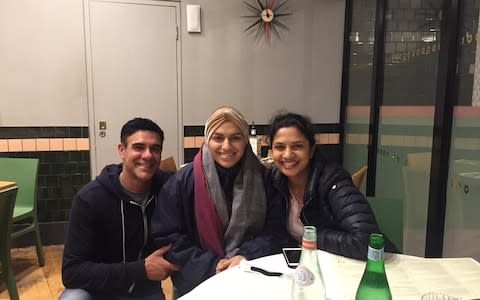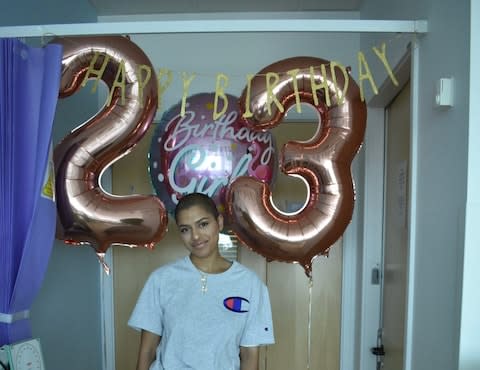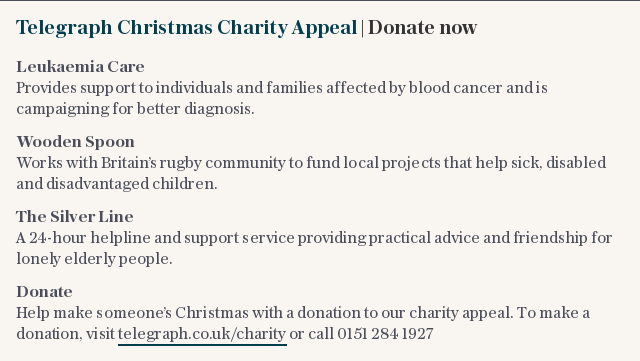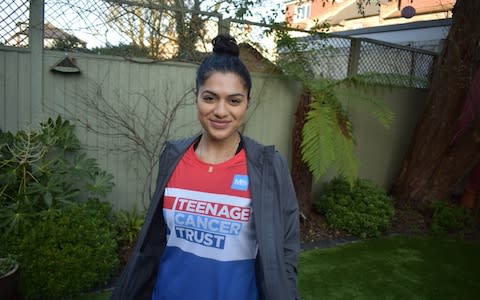Why didn't doctors take my leukaemia symptoms seriously?

Leah Arora was 22 and weeks away from her pharmacy finals at the University of Reading when she was diagnosed with acute myeloid leukaemia (AML) and rushed into chemotherapy. She had been in agony for weeks: it was only after multiple visits to a GP – and crying during an appointment with a haematologist – that she was given the blood test revealing the cause of mysterious, debilitating stomach pain. Her only other symptoms were a bad case of flu and a leg infection (cellulitis).
Now in remission after four rounds of chemotherapy over two years and preparing to return to her studies, Arora reflects on how frustrating it felt not to be listened to by medical professionals when she reported her severe pain. “If I hadn’t cried, the haematologist wouldn’t have taken the blood test, and would have referred me elsewhere,” she explains, sipping a cup of her father’s chai at her family home in Hendon, north London.
Arora ponders whether the “gender health gap” – the imbalance between the healthcare experiences of men and women – had a part to play in her late diagnosis. “I definitely think my age and the fact that I was a young, female student, as well as my ethnicity – I’m half Sri Lankan, half Indian – had something to do with it. But leukaemia can happen to anyone: it doesn’t matter how old you are, what gender you are or what ethnicity you are.”
At first, when Arora began to experience stomach pain in the night but was unable to vomit, she thought it was irritable bowel syndrome, and didn’t want to bother the doctor. “GPs can be dismissive, but people also ignore their own symptoms, hoping they’ll go away,” she says.
“Two weeks later, I was in increasing agony and unable to eat, so I finally went to a GP, who gave me omeprazole for acid reflux. I was certain that wasn’t right, and told her I needed something more, because the pain was so terrible,” Arora recalls. “I tried to get across how much it was affecting me, but she said it wasn’t unusual, that in two weeks I’d be fine. I don’t think she believed how painful it was. I didn’t have the usual symptoms, like bruising, but it didn’t seem like acid reflux: I took the omeprazole and a lot of Gaviscon, but nothing helped and it was getting worse.

“Nobody except my parents took it seriously. I think the doctors assumed I was exaggerating, or that I wasn’t taking my medicine. When I went back two weeks later, the doctor suggested it was gallstones. Again, I was convinced that wasn’t the problem: I’m young, I don’t have a fatty diet – but she assured me it was common. I went for an ultrasound at the Royal Free Hospital, confirming it wasn’t gallstones – but I also had a blood test, which showed my inflammation rate was high, and my platelet count low.
“She referred me to a haematologist, telling me the usual wait was 10 weeks, but she’d put me on the fast track for cancer patients. She said ‘because I don’t think you’ll last that long otherwise!’ and laughed. It was a strange thing to say, but I thought she was referring to the fact that I couldn’t eat. I still didn’t think I had cancer, thinking perhaps it was a stomach ulcer. I wanted to remove the guesswork and have it treated.”
When Arora saw a haematologist three weeks later, to her horror, the expert said there was nothing she could do for her: she’d been referred to the wrong department, and should be seeing a gastroenterologist. “I started crying and begged her to do anything she could to find out what was wrong. I stressed that I was up for hours at night in excruciating pain and completely unable to eat. Thankfully, she agreed to give me the full blood test which allowed for my diagnosis.”
By that time, the cancer had spread to affect a large percentage of her blood. Any more, doctors later told her, and her body would no longer have functioned. As a result of the delays she encountered, Arora is now a keen supporter of the #SpotLeukaemia campaign run by Leukaemia Care, one of the charities supported by The Telegraph’s Christmas appeal, which aims to help to prevent late diagnosis and raise awareness about leukaemia.
“The next day, the haematologist called me into hospital and told me to bring an overnight bag and to make sure someone could come with me. That was the day I was diagnosed, on Feb 7 2018, and I moved into hospital straight away. My parents were with me and we took a moment to hold each other and cry. The haematologist told me that, had I not cried the day before, she wouldn’t have taken the blood test.
“I lived in and out of hospital for six months during chemotherapy. I can’t fault the treatment I received on the Teenage Cancer Trust ward at University College Hospital. I had my own room and bathroom, which was terrifying, because it showed how serious it was,” she says, showing me a picture of herself celebrating her 23rd birthday mid-treatment and without her hair in her hospital room, filled with bunting and balloons. “The chemo was horrible. My mum, who is a police officer, was given compassionate leave and stayed with me on a camp bed, and my dad, a tennis coach, visited every day.

“I don’t have brothers or sisters, so it was the three of us supporting each other. I couldn’t have done it without them. I had all the side-effects, including mucositis [inflammation and ulceration of the mucous membranes lining the digestive tract], pain, and fatigue, and needed help just to get out of bed. I was on a lot of morphine, which made me drowsy, so I was switched to oxycodone. I had the worst withdrawals after my second round of chemotherapy. At that point, I felt very depressed.”
In remission since Nov 27 2018, Arora has spent the past year working in a pharmacy, living at home as she builds herself up to return to normal life and to university to finally take her exams. She is training to run this year’s London Marathon to raise funds for the Teenage Cancer Trust with her uncle, who is running for Leukaemia Care – as a way to give back and raise awareness.
“Everyone, including healthcare professionals, needs to be made more aware that leukaemia can strike anyone, any time,” she says. “No one goes to a GP if they don’t think something’s wrong, so health professionals need to be trained better to listen to their patients. If you think something is wrong, go to the doctor, make sure they listen. Be honest about all your symptoms – even if something seems irrelevant, it could help them build a bigger picture.

“Early diagnosis is always best – the sooner you’re treated, the sooner you have a chance of getting better – and for women it can also mean preserving your future in terms of fertility,” she points out. Loss of fertility is common after a stem cell or bone marrow transplant, and chemotherapy can affect a woman’s fertility by stopping the ovaries from producing eggs, though that was not the case for Arora. Some women are able to store embryos or eggs before starting cancer treatment, though it’s not always possible.
“If I’d needed a transplant as part of my treatment, I might have become infertile as a result. Because I was diagnosed so late and my symptoms were initially ignored, I didn’t have time to consider the option of freezing my eggs, as I needed the chemotherapy to start straight away,” she explains.
“It’s crazy. A simple blood test was all that was needed to spot it sooner.”

The gender health gap
Women wait longer for medication and to be diagnosed with cancer or heart disease, Gabrielle Jackson writes in Pain and Prejudice (£14.99, Telegraph Books). The discrepancy shows in the misdiagnosis of symptoms, or in cases when health concerns aren’t taken as seriously.
Women, especially younger ones, don’t seek help for fear of being perceived as melodramatic, even delaying or failing to seek medical advice for a suspected heart attack for fear of being considered a hypochondriac, according to researchers at Yale University. “Participants described feeling anxious about what would happen if they initiated a false alarm,” the researchers noted.
When men and women present with the same acute abdominal pain, women have to wait longer to see a doctor and are less likely to be given painkillers, according to a study published in the journal Academic Emergency Medicine.
Women are 13 per cent less likely than a man of the same age to receive life-saving drugs, according to a heart failure study from the University of Oxford.
Women required three or more pre-referral consultations than men for bladder cancer diagnosis according to researchers from the University of Cambridge.
Women have also historically been under-represented in clinical trials, limiting how much we know about the difference between women’s health and men’s – an example of what journalist Caroline Criado Perez describes as a “data gap”. For further research on the gender health gap, read Invisible Women, by Caroline Criado Perez (£8.49).
Leukaemia Care is one of three charities supported by this year’s Telegraph Christmas Appeal. The others are Wooden Spoon, which works with the rugby community to raise money for disabled and disadvantaged children, and The Silver Line, a telephone support service for lonely elderly people. To donate, visit telegraph.co.uk/charity or call 0151 284 1927 before the end of January.

